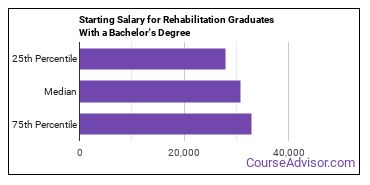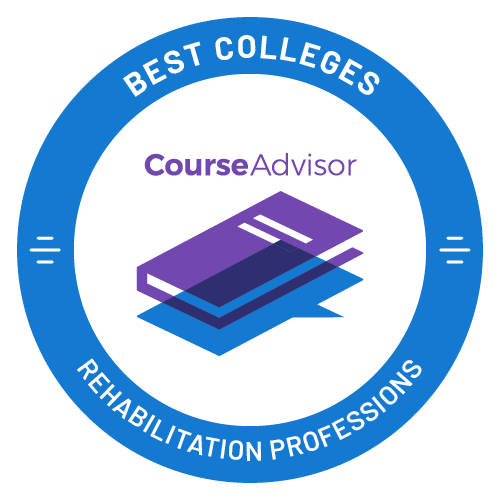Rehabilitation Professions
Featured schools near , edit
Types of Degrees Rehabilitation Professions Majors Are Getting
The following table lists how many rehabilitation and therapeutic professions graduations there were in 2020-2021 for each degree level.
| Education Level | Number of Grads |
|---|---|
| Doctor’s Degree | 15,249 |
| Master’s Degree | 9,152 |
| Bachelor’s Degree | 4,402 |
| Associate Degree | 420 |
| Graduate Certificate | 373 |
| Basic Certificate | 170 |
| Undergraduate Certificate | 67 |
What Rehabilitation Professions Majors Need to Know
People with careers related to rehabilitation were asked what knowledge areas, skills, and abilities were important for their jobs. They weighted these areas on a scale of 1 to 5 with 5 being the highest.
Knowledge Areas for Rehabilitation Majors
According to O*NET survey takers, a major in rehabilitation should prepare you for careers in which you will need to be knowledgeable in the following areas:

- Customer and Personal Service - Knowledge of principles and processes for providing customer and personal services. This includes customer needs assessment, meeting quality standards for services, and evaluation of customer satisfaction.
- English Language - Knowledge of the structure and content of the English language including the meaning and spelling of words, rules of composition, and grammar.
- Psychology - Knowledge of human behavior and performance; individual differences in ability, personality, and interests; learning and motivation; psychological research methods; and the assessment and treatment of behavioral and affective disorders.
- Education and Training - Knowledge of principles and methods for curriculum and training design, teaching and instruction for individuals and groups, and the measurement of training effects.
- Therapy and Counseling - Knowledge of principles, methods, and procedures for diagnosis, treatment, and rehabilitation of physical and mental dysfunctions, and for career counseling and guidance.
Skills for Rehabilitation Majors
rehabilitation majors are found most commonly in careers in which the following skills are important:

- Active Listening - Giving full attention to what other people are saying, taking time to understand the points being made, asking questions as appropriate, and not interrupting at inappropriate times.
- Speaking - Talking to others to convey information effectively.
- Reading Comprehension - Understanding written sentences and paragraphs in work related documents.
- Critical Thinking - Using logic and reasoning to identify the strengths and weaknesses of alternative solutions, conclusions or approaches to problems.
- Social Perceptiveness - Being aware of others' reactions and understanding why they react as they do.
Abilities for Rehabilitation Majors
Some of the most crucial abilities to master while a rehabilitation student include the following:

- Oral Expression - The ability to communicate information and ideas in speaking so others will understand.
- Oral Comprehension - The ability to listen to and understand information and ideas presented through spoken words and sentences.
- Written Comprehension - The ability to read and understand information and ideas presented in writing.
- Problem Sensitivity - The ability to tell when something is wrong or is likely to go wrong. It does not involve solving the problem, only recognizing there is a problem.
- Speech Clarity - The ability to speak clearly so others can understand you.
What Can You Do With a Rehabilitation Professions Major?
Below is a list of occupations associated with rehabilitation:
| Job Title | Job Growth Rate | Median Salary |
|---|---|---|
| Art Therapists | 6.8% | $47,860 |
| Biochemical Engineers | 6.4% | $96,980 |
| Exercise Physiologists | 13.2% | $49,270 |
| Health Specialties Professors | 25.9% | $97,370 |
| Life Scientists | 9.0% | $78,190 |
| Low Vision Therapists, Orientation and Mobility Specialists, and Vision Rehabilitation Therapists | 23.8% | $84,270 |
| Medical Appliance Technicians | 13.3% | $39,190 |
| Music Therapists | 6.8% | $47,860 |
| Occupational Therapists | 23.8% | $84,270 |
| Orthotists and Prosthetists | 21.8% | $69,120 |
| Physical Therapists | 28.0% | $87,930 |
| Recreational Therapists | 6.8% | $47,860 |
| Rehabilitation Counselors | 12.7% | $35,630 |
| Therapists | 19.9% | $50,980 |
Who Is Getting a Bachelor’s Degree in Rehabilitation Professions?
Racial-Ethnic Diversity
At the countrywide level, the racial-ethnic distribution of rehabilitation majors is as follows:

| Race/Ethnicity | Number of Grads |
|---|---|
| Asian | 176 |
| Black or African American | 398 |
| Hispanic or Latino | 631 |
| White | 2,897 |
| International Students | 49 |
| Other Races/Ethnicities | 251 |
Geographic Diversity
Americans aren’t the only ones with an interest in Rehabilitation. About 1.1% of those with this major are international students. The most popular countries for students from outside the country are:
- India
- Canada
- Saudi Arabia
- China
- South Korea
How Much Do Rehabilitation Professions Majors Make?
Bachelor’s Degree Starting Salary
The median early-career salary of rehabilitation and therapeutic professions students with a bachelor’s degree is $30,749 a year according to 2019-2020 data from the U.S. Department of Education. During this timeframe, most salaries fell between $27,857 (25th percentile) and $32,932 (75th percentile).

Note that some of these people may have jobs that are not directly related to a rehabilitation degree.
Salaries According to BLS
Rehabilitation majors often go into careers where salaries can range from $50,640 to $89,150 (25th to 75th percentile). This range includes all degree levels, so you may expect those with a more advanced degree to make more while those with less advanced degrees will typically make less.
To put that into context, according to BLS data from the first quarter of 2020, the typical high school graduate makes between $30,000 and $57,900 a year (25th through 75th percentile). The average person with a bachelor’s degree (any field) makes between $45,600 and $99,000. Advanced degree holders make the most with salaries between $55,600 and $125,400.
Amount of Education Required for Careers Related to Rehabilitation Professions
Some careers associated with rehabilitation require an advanced degree while some may not even require a bachelor’s. In general, the more advanced your degree the more career options will open up to you. However, there is significant time and money that needs to be invested into your education so weigh the pros and cons.
Find out what the typical degree level is for rehabilitation careers below.

| Education Level | Percentage of Workers |
|---|---|
| Less than a High School Diploma | 1.1% |
| High School Diploma - or the equivalent (for example, GED) | 3.5% |
| Post-Secondary Certificate - awarded for training completed after high school (for example, in agriculture or natural resources, computer services, personal or culinary services, engineering technologies, healthcare, construction trades, mechanic and repair technologies, or precision production) | 1.3% |
| Some College Courses | 1.0% |
| Associate’s Degree (or other 2-year degree) | 2.9% |
| Bachelor’s Degree | 36.4% |
| Post-Baccalaureate Certificate - awarded for completion of an organized program of study; designed for people who have completed a Baccalaureate degree but do not meet the requirements of academic degrees carrying the title of Master. | 7.7% |
| Master’s Degree | 34.0% |
| Post-Master’s Certificate - awarded for completion of an organized program of study; designed for people who have completed a Master’s degree but do not meet the requirements of academic degrees at the doctoral level. | 2.9% |
| First Professional Degree - awarded for completion of a program that: requires at least 2 years of college work before entrance into the program, includes a total of at least 6 academic years of work to complete, and provides all remaining academic requirements to begin practice in a profession. | 1.4% |
| Doctoral Degree | 7.0% |
| Post-Doctoral Training | 1.2% |
Online Rehabilitation Professions Programs
In 2020-2021, 596 schools offered a rehabilitation program of some type. The following table lists the number of programs by degree level, along with how many schools offered online courses in the field.
| Degree Level | Colleges Offering Programs | Colleges Offering Online Classes |
|---|---|---|
| Certificate (Less Than 1 Year) | 0 | 0 |
| Certificate (1-2 years) | 16 | 0 |
| Certificate (2-4 Years) | 3 | 0 |
| Associate’s Degree | 58 | 3 |
| Bachelor’s Degree | 78 | 13 |
| Post-Baccalaureate | 0 | 0 |
| Master’s Degree | 384 | 23 |
| Post-Master’s | 46 | 0 |
| Doctor’s Degree (Research) | 109 | 5 |
| Doctor’s Degree (Professional Practice) | 326 | 16 |
| Doctor’s Degree (Other) | 16 | 3 |
Is a Degree in Rehabilitation Professions Worth It?
The median salary for a rehabilitation grad is $73,860 per year. This is based on the weighted average of the most common careers associated with the major.
This is 85% more than the average salary for an individual holding a high school degree. This adds up to a gain of about $679,200 after 20 years!

Top Ranking Lists for Rehabilitation Professions
Explore Major by State
Alabama
California
District of Columbia
Idaho
Kansas
Maryland
Mississippi
Nevada
New York
Oklahoma
South Carolina
Utah
West Virginia
Alaska
Colorado
Florida
Illinois
Kentucky
Massachusetts
Missouri
New Hampshire
North Carolina
Oregon
South Dakota
Vermont
Wisconsin
Majors Related to Rehabilitation Professions
You may also be interested in one of the following majors related to rehabilitation.
References
*The racial-ethnic minorities count is calculated by taking the total number of students and subtracting white students, international students, and students whose race/ethnicity was unknown. This number is then divided by the total number of students at the school to obtain the racial-ethnic minorities percentage.
- College Factual
- College Scorecard
- National Center for Education Statistics
- O*NET Online
- U.S. Bureau of Labor Statistics
- Usual Weekly Earnings of Wage and Salary Workers First Quarter 2020
- Image Credit: By Barbara E. Carver under License
More about our data sources and methodologies.
Featured Schools
 Request Info
Request Info
|
Southern New Hampshire University You have goals. Southern New Hampshire University can help you get there. Whether you need a bachelor's degree to get into a career or want a master's degree to move up in your current career, SNHU has an online program for you. Find your degree from over 200 online programs. Learn More > |

